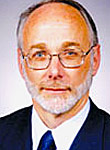Thomas Baer, a 1974 Lawrence graduate and executive director of the Stanford Photonics Research Center at Stanford University discusses the role photonics technologies are playing in the implementation of strategies designed to lessen the possibility of radical climate changes due to global warming in a Lawrence University Science Hall Colloquium.

Baer presents “The Global Impact of Photonics: Renewable Resources, Climate Change and Energy Conservation” Monday, Sept. 26 at 4:30 p.m. in Thomas Steitz Hall of Science, Room 102.
Photonics, one of the world’s fastest growing high-tech industries, is expected to be a critical factor in multi-faceted strategies designed mitigate the impact of rising atmospheric levels of carbon dioxide, including the development of alternative non-carbon energy sources and the replacement of existing infrastructure with more energy efficient technologies.
Recognized in 1994 with Lawrence’s Lucia Russell Briggs Distinguished Achievement Award, Baer has been awarded more than 60 patents. He is a Fellow in the American Association for the Advancement of Science and The Optical Society of America, an organization he served as president of in 2009.
Founded in 1847, Lawrence University uniquely integrates a college of liberal arts and sciences with a world-class conservatory of music, both devoted exclusively to undergraduate education. Ranked among America’s best colleges, it was selected for inclusion in the book “Colleges That Change Lives: 40 Schools That Will Change the Way You Think About College.” Individualized learning, the development of multiple interests and community engagement are central to the Lawrence experience. Lawrence draws its 1,520 students from 44 states and 56 countries.